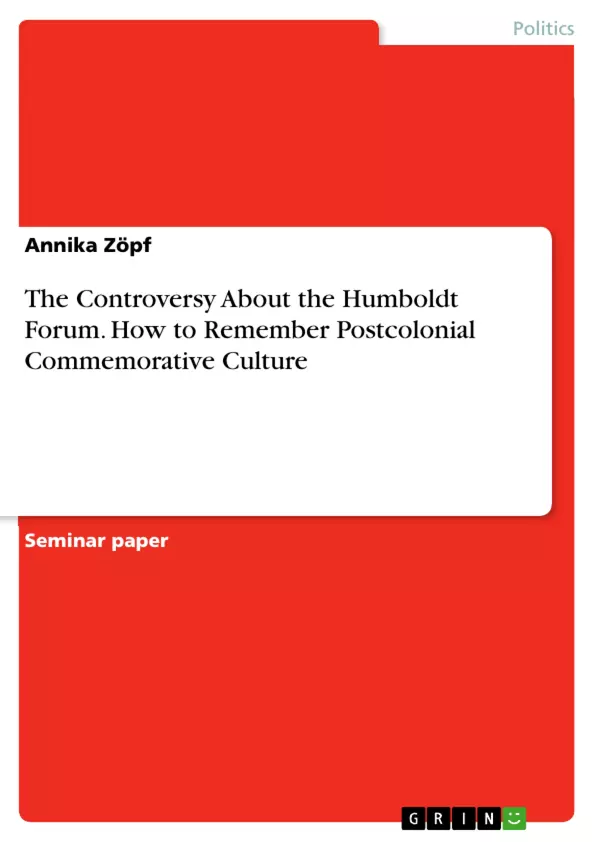Is there a right or wrong way to remember such times and if so, how should postcolonial commemorative culture be realized? As the focus of this paper lies mainly on Germany it will therefore first give an overview of German postcolonialism as this is the current hot topic with the Humboldt Forum being in construction, then it takes a closer look at what the Humboldt forum exactly is and why it is so controversial. After that it gives an insight into how other countries deal with the issue of publicly remembering sensible subjects and it concludes with examples of how countries could possibly remember in a more sensible way and an outlook on the future of such institutions, the Humboldt Forum in particular.
“To be in touch with as much of the world as possible" is what Wilhelm von Humboldt once said. This quotation is cited on the cover of the Humboldt Forum brochure advertising the new museum which is currently being built in Germany. Amongst other things it will later showcase art which was acquired during the postcolonial period. This is the reason, why with the museum and this quotation there comes a whole lot of controversy that reaches far over the borders of Germany. The core of the discussion is whether proudly displaying items which were obtained under difficult, sometimes even violent and nonconsensual conditions, can ever be a sign for “positive coexistence" and “encouraging curiosity and enthusiasm about unfamiliar realms". So, what the founders of such institutions intended visitors to remember while they are in the museum is the historical past of the countries from which the items were taken. But what should also be remembered, and not celebrated at all here, are the lootings and exploitations of the Europeans during postcolonial times which is more or less quietly being swept under the rug.
Inhaltsverzeichnis (Table of Contents)
- Introduction
- The Basics of German (Post-)Colonialism
- The Humboldt Forum
- Origin of the Name
- Purpose
- Controversy
- Postcolonial Commemorative Culture in other countries
- France
- England
- How to Postcolonial Commemorative Culture
- Future of the Humboldt Forum
- Conclusion
- Limitations
Zielsetzung und Themenschwerpunkte (Objectives and Key Themes)
This paper delves into the complexities surrounding postcolonial commemorative culture, specifically examining the newly built Humboldt Forum in Germany and its controversial display of art acquired during the colonial period. It aims to analyze the historical context of German colonialism, evaluate the purpose and intended message of the museum, and explore alternative approaches to postcolonial commemoration.
- The historical context of German colonialism
- The complexities of displaying colonial artifacts in museums
- The role of museums in promoting historical understanding and reconciliation
- The potential for postcolonial commemorative culture to foster dialogue and cultural exchange
- The future of the Humboldt Forum and similar institutions
Zusammenfassung der Kapitel (Chapter Summaries)
The paper begins by introducing the concept of postcolonial commemorative culture and highlighting the controversy surrounding the Humboldt Forum, a museum showcasing art from Germany's colonial past. It then provides an overview of German colonialism, exploring its history, objectives, and impact on colonized nations. The paper also examines the approach of other countries in commemorating their colonial past, focusing on France and England. Finally, it discusses alternative approaches to postcolonial commemorative culture and explores the future of the Humboldt Forum and similar institutions.
Schlüsselwörter (Keywords)
The paper explores key concepts such as postcolonial commemorative culture, the Humboldt Forum, German colonialism, cultural appropriation, museum ethics, and alternative approaches to remembering the colonial past. It also examines the role of museums in promoting historical understanding and reconciliation.
Frequently Asked Questions
Why is the Humboldt Forum so controversial?
The controversy stems from the display of colonial artifacts that were often acquired under violent or non-consensual conditions, raising questions about museum ethics and historical justice.
What is postcolonial commemorative culture?
It refers to how societies remember and address the colonial past, including the handling of looted art and the representation of formerly colonized nations in public institutions.
Who are the namesakes of the Humboldt Forum?
The museum is named after Alexander and Wilhelm von Humboldt, brothers who were key figures in German science and culture, though their legacy is also scrutinized in the context of colonialism.
How do France and England deal with colonial artifacts?
The paper compares German approaches with those of France and England, examining how these former colonial powers manage demands for restitution and historical transparency.
What is the intended purpose of the Humboldt Forum?
Its founders intended it to be a place for "positive coexistence" and "encouraging curiosity about unfamiliar realms," though critics argue it sometimes sweeps the darker side of history under the rug.
Can displaying colonial items ever be seen as positive?
The debate centers on whether proud displays can foster dialogue or if they inherently celebrate exploitation unless accompanied by a critical and sensitive context.
- Quote paper
- Annika Zöpf (Author), 2019, The Controversy About the Humboldt Forum. How to Remember Postcolonial Commemorative Culture, Munich, GRIN Verlag, https://www.grin.com/document/541184



